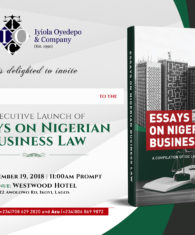CONTRACTING WITH INFLUENCERS
Dear Subscriber,
Traditional media channels (TV, Radio, Print etc) are facing a losing battle with emerging digital information channels (Facebook, YouTube, Instagram etc) and it is only a question of time before traditional media as we know it becomes extinct.
With the advent of new media came a new crop of Influencers who have acquired massive followership on social media platforms. The size of their followers has helped them gain the attention of corporate brands who then engage them to help sell products and services to their audience.
It is a fact that some of the highest-earning influencers make upwards of $10 million annually for just posting content online and this movement is becoming quite regular in Nigeria with a lot of brands engaging with influencers. This trend informs our focus this week as we discuss the elements that govern this kind of collaboration.
An Influencer is an individual who has built a strong relationship with a significant number of followers online through one or more social media platforms, and whose actions and recommendations impact the behavior of his/her followers. On the other side of the equation we have the advertiser, usually a brand or a company that engages the services of the influencer to promote its products or services. This relationship is usually governed by a Influencer Marketing Agreement which should contain the following terms:
Duties of the Influencer: It is important to clearly spell out the scope of the obligations expected from the influencer which among other things should include devotion of reasonable time and effort to promoting the brand. For instance, the agreement should specify the frequency of the influencers social media posts and the types and length of posts that are required under the agreement, and should include a provision for the brand to be able to re-post social media activity through its own digital media channels. Also important is the need for the influencer to maintain public good will during the campaign and generally avoid any action that can cause a backlash for the brand.
Proprietary Rights: An important provision to include in the agreement is the brand’s perpetual right to use all intellectual property produced from projects or campaigns. The agreement should indemnify the Brand from potential infringement claims by placing an obligation on the influencer to ensure that all work provided by the Influencer is original and doesn’t infringe the proprietary rights of others.
Duration and Exclusivity of Campaign – Brand and Influencers should agree on campaign schedule and period in which Influencer should refrain from working with or mentioning a brand’s competitor.
Termination Clause: The agreement should provide for an exit clause and what is expected from both parties in the event of a termination. The provision can also provide for termination of the contract in the event the influencers goodwill declines.
CONCLUSION
Influencer marketing has become popular because it has been seen to work, however there is the need for both Brand and Influencer to pay attention to the fine print in other to forestall conflict. It is advisable that parties consult attorneys familiar with these types of agreements to ensure that they are properly guided.
The content of this document is solely for information purposes only and should not in any way be construed as a legal opinion. If you require specific legal advice on any of the matters covered in this article please contact a professional.
MOTIVATIONAL VIDEO
We understand how tough it is being in business, so the “IOC Weekly” Editorial Team has decided to add inspiring videos to our weekly articles to juice up your week. We hope it serves the purpose.
Cheers,to a fruitful week.






